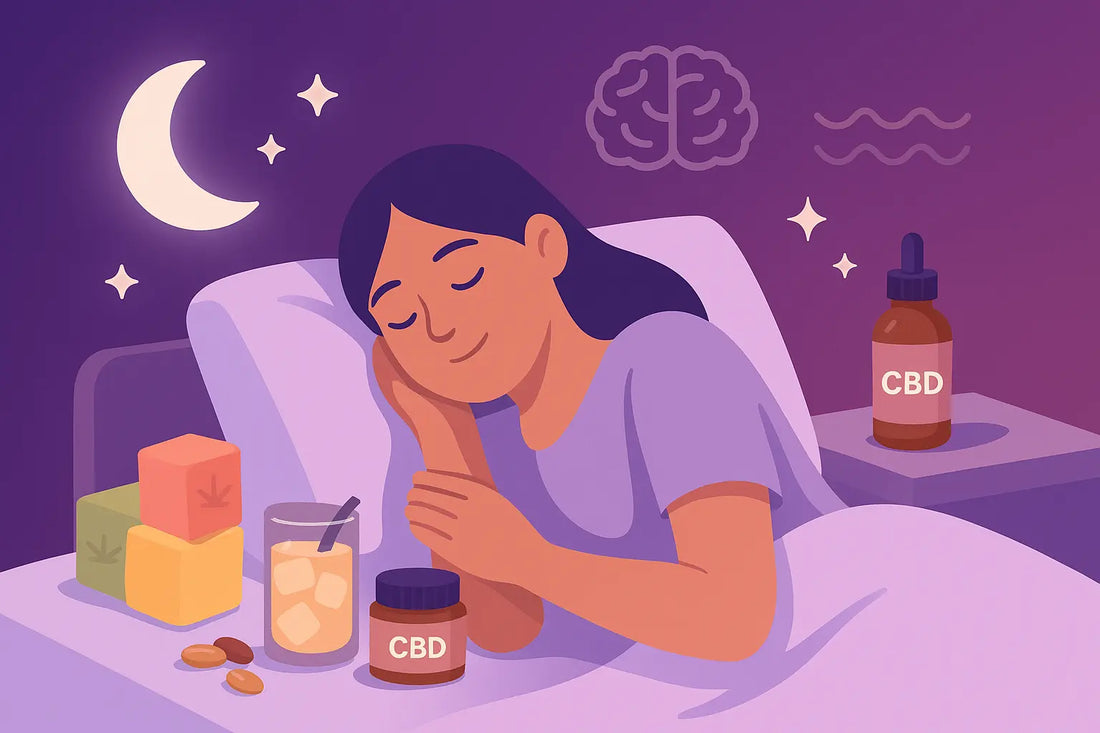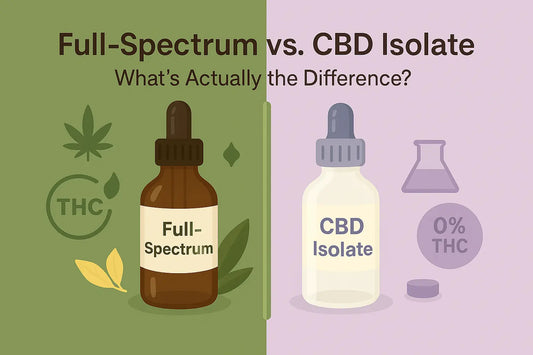
How CBD Helps You Sleep: Backed by Science
Cenk CetinShare
Introduction
CBD (cannabidiol) has skyrocketed in popularity, becoming a go-to wellness remedy known for its potential to support mental and physical health. Unlike THC, CBD doesn’t cause a high, making it an appealing choice for those seeking natural relief. One area where CBD is making waves is sleep, as more people turn to it to help manage insomnia, anxiety, and other sleep-related issues.
Sleep disorders are increasingly common, leaving many struggling to get the rest they need. With conventional treatments often carrying unwanted side effects, CBD is gaining attention as a potential game-changer in improving sleep quality. In this article, we’ll dive into the science behind how CBD affects sleep, exploring its impact on the body’s systems and what research says about its effectiveness as a sleep aid.
Key Takeaways
- Research suggests CBD may help with insomnia, anxiety-related sleep disturbances, chronic pain, and possibly sleep apnea.
- CBD interacts with the body’s ECS and influences neurotransmitters, playing key roles in sleep regulation.
- While CBD shows promise, individuals should consult a healthcare provider before using it as a sleep aid.
Understanding CBD and Its Effects on the Body
CBD (cannabidiol), is a plant-based compound derived from the cannabis plant. Unlike THC, which has psychoactive properties, CBD does not cause a high, making it a natural choice for individuals seeking wellness benefits without intoxication. THC is recognized for its mind-altering effects, whereas CBD provides a gentler, therapeutic influence on the body, gaining attention for its potential to ease pain, lessen anxiety, and support relaxation.
The endocannabinoid system (ECS) is a sophisticated network of receptors and neurotransmitters that plays a key role in regulating essential bodily functions, including mood, sleep, appetite, and pain response. When CBD enters the body, it interacts with these receptors—mainly CB1 and CB2—helping to balance and regulate bodily processes. By modulating the ECS, CBD may encourage a sense of calm and promote homeostasis, the body’s natural state of balance. This interaction with the ECS is what allows CBD to potentially improve sleep patterns, reduce anxiety, and enhance overall well-being, making it a promising natural remedy for many.
The Relationship Between CBD and Sleep
A good night’s sleep is essential for overall well-being, and it follows a structured cycle consisting of different stages. The sleep cycle includes light sleep, deep sleep, and REM (rapid eye movement) sleep, each playing a vital role in physical and mental restoration. Interruptions in this cycle can result in inadequate sleep, causing individuals to feel tired, unfocused, and easily irritated.
CBD has gained attention for its potential to improve sleep by interacting with the body’s natural systems. One of the key ways it may influence sleep patterns is by promoting relaxation and reducing anxiety—two common culprits behind insomnia and restlessness. By interacting with receptors involved in stress regulation, CBD may help calm the mind, making it easier to fall and stay asleep.
Additionally, CBD is believed to impact the body’s circadian rhythm, the internal clock that regulates sleep-wake cycles. By influencing neurotransmitters and hormones like cortisol and serotonin, CBD may help balance sleep patterns, potentially aiding those who struggle with irregular sleep schedules or insomnia. While research is still ongoing, these effects suggest CBD could be a natural tool for achieving more restful, uninterrupted sleep.
Scientific Studies on CBD and Sleep
As interest in CBD’s sleep-enhancing potential grows, scientific research is beginning to uncover how it may influence sleep quality. Although studies are ongoing, preliminary evidence points to CBD as a potentially effective natural solution for those experiencing insomnia, anxiety-related sleep disruptions, and inconsistent sleep patterns.
One notable study published in The Permanente Journal examined the effects of CBD on anxiety and sleep. Researchers found that 79% of participants reported lower anxiety levels, while 66% experienced improved sleep within the first month of use. This indicates that CBD's soothing properties could be essential in fostering better sleep.
Another study in Frontiers in Pharmacology explored how CBD impacts REM sleep behavior disorder (RBD), a condition often linked to neurological diseases like Parkinson’s. The findings indicated that CBD helped reduce symptoms of RBD, leading to more stable sleep cycles.
When it comes to dosage and timing, research is still inconclusive. Some studies suggest that lower doses promote wakefulness, while higher doses (typically 160 mg or more) aid in sleep. Timing also plays a role—taking CBD in the evening may help relax the body and mind before bedtime.
Although these studies showcase CBD's potential as a sleep aid, additional clinical research is necessary to establish the ideal dosages, delivery methods, and long-term impact. As science continues to explore CBD’s role in sleep regulation, it remains an intriguing option for those seeking a natural way to improve their rest.
How CBD May Help Specific Sleep Disorders
CBD’s potential sleep-enhancing effects extend beyond general relaxation—it may also offer relief for specific sleep disorders that disrupt rest and recovery. Here’s how CBD could play a role in improving sleep for those struggling with common sleep-related conditions:
-
Insomnia: Trouble falling or staying asleep? Research suggests that CBD may help regulate sleep patterns by reducing stress and promoting relaxation. Its ability to calm an overactive mind could make it a natural alternative for those who struggle with restless nights.
-
Anxiety-Induced Sleep Disruption: Anxiety is a primary factor behind sleep disturbances, hindering the body’s ability to relax and rest. CBD interacts with serotonin receptors, which play a key role in mood regulation. By easing anxiety, CBD may help create the mental calm needed for uninterrupted sleep.
-
Sleep Apnea: Sleep apnea, a condition marked by interrupted breathing during sleep, can leave sufferers feeling exhausted. While research is still in its early stages, some studies suggest that CBD’s anti-inflammatory properties may help by reducing airway obstruction. However, more studies are needed to confirm its effectiveness.
- Chronic Pain and Sleep: Pain-related sleep disturbances can make restful nights nearly impossible. CBD’s potential anti-inflammatory and analgesic effects may help alleviate discomfort, allowing the body to relax and achieve deeper, more restorative sleep.
The Mechanism Behind CBD’s Sleep Benefits
CBD’s potential to improve sleep isn’t just anecdotal—scientists believe it works by interacting with key systems in the body that regulate relaxation and rest. Here’s how:
-
Neurotransmitter Regulation: CBD influences neurotransmitters like serotonin and GABA, both of which play essential roles in mood and sleep. Serotonin helps regulate sleep-wake cycles, while GABA is the brain’s primary inhibitory neurotransmitter, promoting relaxation and reducing overstimulation. By enhancing their activity, CBD may create a calming effect that supports restful sleep.
- Endocannabinoid System (ECS) Interaction: The ECS is essential for preserving balance in the body, including regulating sleep. CBD interacts with CB1 and CB2 receptors, which are found in the brain and nervous system. This interaction may help balance sleep patterns, reduce stress response, and ease the transition into deeper, more restorative sleep cycles.
The Bottom Line
CBD’s growing popularity as a sleep aid is supported by emerging research and user experiences. By interacting with the endocannabinoid system (ECS) and influencing neurotransmitters like serotonin and GABA, CBD shows promise in promoting relaxation, reducing anxiety, and improving sleep quality. Studies suggest it may help with insomnia, anxiety-related sleep disturbances, and even pain-induced sleep issues, offering a natural alternative to conventional sleep aids.
However, while early research is encouraging, more clinical studies are needed to fully understand its long-term effects, optimal dosages, and overall efficacy. As science continues to explore CBD’s role in sleep regulation, individuals considering it for sleep support should consult a healthcare professional to determine the best approach for their needs.








